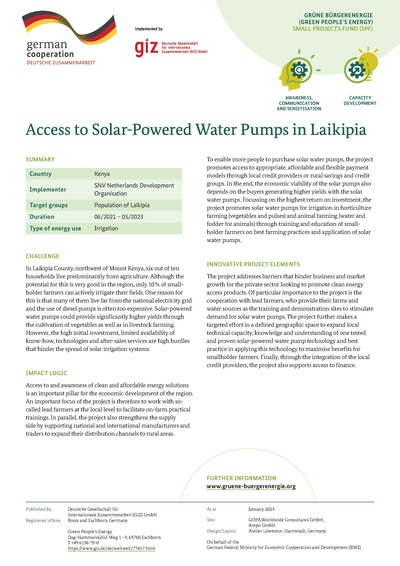Difference between revisions of "Access to Solar-Powered Water Pumps in Laikipia"
From energypedia
***** (***** | *****) |
***** (***** | *****) |
||
| Line 4: | Line 4: | ||
|GBE date start=June 2021 | |GBE date start=June 2021 | ||
|GBE date end=May 2023 | |GBE date end=May 2023 | ||
| − | |GBE project description=Access to and awareness of clean and affordable energy solutions is an important pillar for the economic development of the region. An important focus of the project is therefore to work with so-called lead farmers at the local level to facilitate on-farm practical trainings. In parallel, the project also strengthens the supply side by supporting national and international manufacturers and traders to expand their distribution channels to rural areas. To enable more people to purchase solar water pumps, the project promotes access to appropriate, affordable and flexible payment models through local credit providers or rural savings and credit groups. In the end, the economic viability of the solar pumps also depends on the buyers generating higher yields with the solar water pumps. Focussing on the highest return on investment, the project promotes solar water pumps for irrigation in horticulture farming (vegetables and pulses) and animal farming (water and fodder for animals) through training and education of smallholder farmers on best farming practices and application of solar water pumps. | + | |GBE project description=Access to and awareness of clean and affordable energy solutions is an important pillar for the economic development of the region. An important focus of the project is therefore to work with so-called lead farmers at the local level to facilitate on-farm practical trainings. In parallel, the project also strengthens the supply side by supporting national and international manufacturers and traders to expand their distribution channels to rural areas. To enable more people to purchase solar water pumps, the project promotes access to appropriate, affordable and flexible payment models through local credit providers or rural savings and credit groups. In the end, the economic viability of the solar pumps also depends on the buyers generating higher yields with the solar water pumps. Focussing on the highest return on investment, the project promotes solar water pumps for irrigation in horticulture farming (vegetables and pulses) and animal farming (water and fodder for animals) through training and education of smallholder farmers on best farming practices and application of solar water pumps. |
| + | The project addresses barriers that hinder business and market growth for the private sector looking to promote clean energy access products. Of particular importance to the project is the cooperation with lead farmers, who provide their farms and water sources as the training and demonstration sites to stimulate demand for solar water pumps. The project further makes a targeted effort in a defined geographic space to expand local technical capacity, knowledge and understanding of one tested and proven solar-powered water pump technology and best practice in applying this technology to maximise benefits for smallholder farmers. Finally, through the integration of the local credit providers,the project also supports access to finance. | ||
|GBE financed=Small Projects Fund | |GBE financed=Small Projects Fund | ||
|GBE category produse=Productive Use | |GBE category produse=Productive Use | ||
Revision as of 08:15, 31 August 2023
Access to Solar-Powered Water Pumps in Laikipia
Last edit made by Helen Mengs on 2024-05-07. This is a wiki, do not hesitate to update information by clicking on "Edit with form".
Key Data
Organisation
SNV Netherlands Development Organisation
Duration
June 2021 - May 2023
Project Description
Access to and awareness of clean and affordable energy solutions is an important pillar for the economic development of the region. An important focus of the project is therefore to work with so-called lead farmers at the local level to facilitate on-farm practical trainings. In parallel, the project also strengthens the supply side by supporting national and international manufacturers and traders to expand their distribution channels to rural areas. To enable more people to purchase solar water pumps, the project promotes access to appropriate, affordable and flexible payment models through local credit providers or rural savings and credit groups. In the end, the economic viability of the solar pumps also depends on the buyers generating higher yields with the solar water pumps. Focussing on the highest return on investment, the project promotes solar water pumps for irrigation in horticulture farming (vegetables and pulses) and animal farming (water and fodder for animals) through training and education of smallholder farmers on best farming practices and application of solar water pumps.
The project addresses barriers that hinder business and market growth for the private sector looking to promote clean energy access products. Of particular importance to the project is the cooperation with lead farmers, who provide their farms and water sources as the training and demonstration sites to stimulate demand for solar water pumps. The project further makes a targeted effort in a defined geographic space to expand local technical capacity, knowledge and understanding of one tested and proven solar-powered water pump technology and best practice in applying this technology to maximise benefits for smallholder farmers. Finally, through the integration of the local credit providers,the project also supports access to finance.
GBE Component
Small Projects Fund
Categories
- Productive Use
- Skills Development
- Business Development Support
Factsheet
Location
Country SPF
Kenya
Geographic coordinates of project site
{{#geocode: 0.28585, 36.82577}}
Latitude Longitude




















